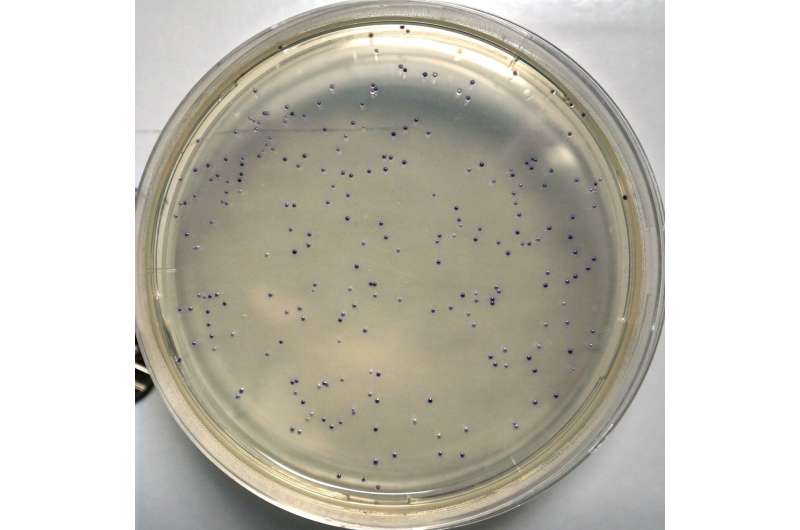Bacteria in a petri dish grown using the team's new method. Credit: Yang Liu
Bacteria could be used to produce large quantities of medicines and fuels using a new gene programming technique, research suggests.
The powerful method could enable bacteria to be used as cheap and environmentally friendly living factories that make a range of useful products.
It will allow researchers to target genes that are normally difficult to activate, including those involved in infections, or with industrial applications.
The advance could also make it easier to study how harmful strains of bacteria thrive and cause infections, researchers say.
Scientists at the University of Edinburgh invented the new technique—known as programmable gene activation—which enables them to control a wider range of genes and increase product yields.
Until now, a lack of techniques that work well in bacteria has hindered research and limited their ability to be used to make useful products.
Using the new method, levels of gene activation are around 100 times higher than existing techniques, the team says. Current methods also mainly target basic genes involved in bacterial survival.
The team's technique is adapted from an approach that uses scissor-like molecules—called CRISPR molecules—to make precise changes to the genetic code. They adapted the technology by attaching small guide molecules and proteins that target and switch on genes.
Their technique was developed for a widely studied species called Escherichia coli and a soil bacterium with potential industry applications. The method is also likely to work in many other species of bacteria, researchers say.
The team also developed a reusable scanning platform that makes it faster and cheaper to find the best ways of activating multiple genes in a pattern that produces high yields of useful substances.
The study, published in the journal Nature Communications, was funded by the Biotechnology and Biological Sciences Research Council, UK Research and Innovation, Leverhulme Trust and Wellcome.
Dr. Baojun Wang, of the University of Edinburgh's School of Biological Sciences, who led the study, said: "This new method has the potential to be a powerful tool for programing bacteria, with diverse applications for research and industry. It could help save a lot of time and money."
More information: Yang Liu et al. Engineered CRISPRa enables programmable eukaryote-like gene activation in bacteria, Nature Communications (2019). DOI: 10.1038/s41467-019-11479-0
Journal information: Nature Communications
Provided by University of Edinburgh























